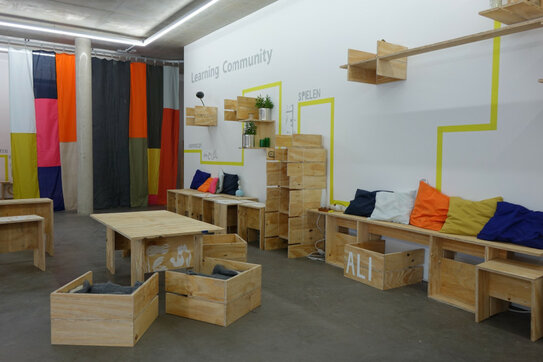Learning Community

A socially integrative art project with Anne-Laure Gestering from raumlaborberlin, Margit Czenki & Gintersdorfer/Klaßen
From December 2015, 300 refugees have been housed in shared accommodation that was formerly Zeppelin University’s temporary „Container University“, close by the University’s new campus. How should a university, as a neighbor, act in this situation? In what ways could an art project contribute productively to the situation of the newcomers?
With the four-month project “Learning Community“, the Zeppelin University artsprogram and student initiativ welt_raum transformed the „White Box“ space into a creative paradigm for encounter and exchange. Based on workshops with architects and artists, weekly meetings and events, students, refugees and ZU employees together experimented and lived as a community. The aim of the “Learning Community“ was to develop, through creative practices, strategies for new forms of living together in an intercultural society.
The Workshops
The interior design and transformation of the exhibition space into a multi-use room using timber and sewn felt was developed through a workshop, with the architect Anne-Laure Gestering from raumlaborberlin, devised as forming both an invitation to take part and for participants to get to know each other. Each step was taken collectively, from the basic construction, the assembly of the furniture to the occupation of the space. The design used a flexible module that in different combinations was able to create new situations and to react to the shifting needs of the project and its participants.
In a second workshop, Anne-Laure Gestering used her experience from working in an initiative with refugees and local residents in Berlin Kreuzberg, “Die Gärtnerei“. During a two-day Urban Gardening Workshop the shared outdoor area of the former Container Uni was enlivened and enhanced with the addition of raised beds and new planting.
Portable connected devices and smartphones played a central role in the film workshop of the Hamburg-based artist and filmmaker Margit Czenki. At the center of her seminar on “Mobile technologies, migration and image production“ were the participants’ “treasures“ on smartphones - valuable images, video and audio serving as personal memories. The results were presented as film montages in the White Box and at Galerie Bodenseekreis in April 2016. With a background in such projects as Hamburg’s “Park¬Fiction“, and “PlanBude“, and involvement in in the “Right to the City “ movement, Margit Czenki has significant experience in creative and participative planning processes.
The group Gintersdorfer/Klaßen conducted a dance workshop in which migration and community building were examined through discourse and physical forms of expression. The performance collective, with a hinterland of sharp and challenging theater work, scrutinized contemporary European philosophical concepts around the issues of migration. In “Stretch Identities“ (2014) Gin-ters¬dor¬fer/Kla¬ßen use Alain Badiou's concept of the same name to address, through performance, migration, political protest and the instrumentalization of refugees.
Lectures/ Events
To mark the launch of the project in November 2015, a reading of the book “Neue Heimat. Wie Flüchtlinge uns zu besseren Nachbarn machen” (A New Place: how refugees make us better neighbors) took place. In this text, the Berlin-based Belarussian Marina Naprushkina describes her experience of the Berlin initiative “Neue Nachbarschaft // Moabit“ (New Neighborhood // Moabit).
In collaboration with ZU’s “Club of International Politics“, Werner Schellenberg was invited to Friedrichshafen, where he talked about his work as a planner and consultant in establishing refugee camps for the UNHCR throughout the world, providing a wider perspective to the issues.
Along with the cultural department of the Bodenseekreis (the local authority), the „Learning Community“ hosted a panel discussion entitled “Neu[seh]land - Geschichten von Flucht und An-kommen“ (New [Zea]land/ New ground - Stories of Exodus and Arrival) which focused on the work with refugees in the Bodensse district and included a reading with Katrin Seglitz.
The question of suitable living spaces for refugees and the organization of the living together in the city was engaged with and in co-operation with the Baden-Württemberg Chamber of Architects, a lecture by the architect Herwig Spiegel from the Viennese architectural firm „Alles wird Gut Architekten“.
In another evening event, the human rights activist Napuli Paul Görlich reported on her experiences as an activist and on her political fight. Originally from the South Sudan, Napuli Paul Görlich is one of the performers of „Stretch Identities“ and is part of the Berliner Oranienplatz movement, which protested from 2012 to 2014 against the accommodation of refugees in shelters, deportations, the ban on employment and residency requirements.
Weekly Program
Whilst the exhibition was open, a flexible weekly program took place during the so-called “Open Tea Time“ and other events, such as “Women's Breakfast“, “Children's Afternoons“, “Theater for Children“, “Language cafe“, “Transcultural Kitchen“ and “Office ours“.
Project Team
Artistic Direction: Caroline Brendel und Luzi Gross, graduates of the ZU Master's course „Communication & Cultural Management“
Direction artsprogram: Ulrike Shepherd, Curator of Visual Art & Coordinator of the artsprogram and Prof. Dr. Karen van den Berg, Academic Head of the artsprogram
Direction welt_raum: Patrick Lühlow and Tim Schleicher, Students of Zeppelin University
Partners and Sponsors
Chamber of Architects Baden-Württemberg, culture department Bodenseekreis, Club of International Politics, Student Lounge of the ZU, Zeppelin University, Zeppelin Universitätsgesellschaft (ZUG) (Zeppelin University Cooperation).
The exhibition space „White Box“ and exhibition program are sponsored by the Fränkle Foundation.

